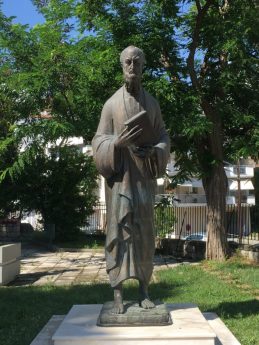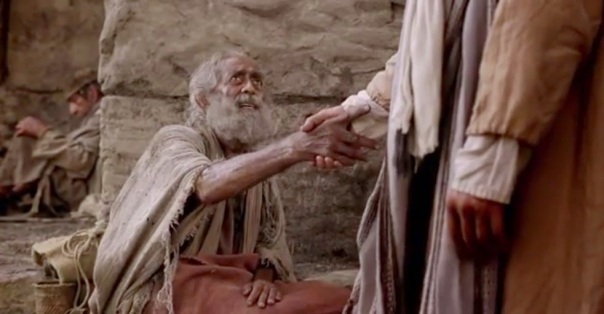In 1997, about the time Circle of Hope hired Gerry West to help with music, a couple of ethnographic filmmakers followed a theater group through Papua New Guinea who were hired to be “advertising missionaries.” We once had an IVEP person connect with Circle of Hope from Papua, so that makes the film even more interesting [about IVEP].

Back then in Papua New Guinea, three quarters of the population could not be reached by the regular advertising mediums of television, radio or print. “The market” had to be developed by other means. Small theater groups traveled to remote places performing soap operas devised around advertising messages for a variety of products. They were missionaries sent to bring the consumer revolution to the people of the highlands. They would unfold a set on the back of a flat-bed truck, portraying a modern Western living-room where the advantages of Coca-Cola, Colgate, clothing, canned food, and washing powder were touted. The film observes the impact of the advertising theater on a previously “untouched” village in the remote valley of Yaluba. The change is sometimes comic, but, to my Western eyes, mostly tragic as the natives are converted to the religion of consumer capitalism.
There are reasons we are a well-kept secret
From the beginning, Circle of Hope has had a bad relationship with advertising, since the whole language seems tainted by another religion. As a result, we might be one of the best kept secrets in town. People who find us are consistently relieved to have done so. But they often say, “Why have I never heard about you before now?” One of the reasons is that many of us feel if we tell someone about Jesus or about what His church is doing, it sounds like advertising and advertising is, essentially, evil. Does that make us a very holy group?
Maybe your church feels a similar ambivalence or outright resistance. I was talking to one of Dan’s friends at his wedding last weekend and he said he dabbled in a big Baptist church in Jersey. His take was that people came to it because the church had a bang-up “living nativity” every year. I imagine many in our church and maybe yours would consider that unholy, if not embarrassing, advertising.
So the evil advertisers have shut many of us up. We don’t want to seem like them so we just don’t say anything. That reaction sounds like something right out of Screwtape Letters: “The more often he feels without acting, the less he will be able ever to act, and, in the long run, the less he will be able to feel.” We want to open our mouths because we love Jesus and we think our church is a miracle. But we dare not sound like we are advertising. So we get in the habit of never speaking. Then we become numb to the feeling that people really need to hear from us.
This might sound far-fetched. But I know aversion to advertising is a strong sentiment among us because I have often been in charge of the limited advertising the church does. Many people are extremely sensitive about how we look to the stranger they imagine who receives our mailings or sees our website. They are afraid those unsuspecting people are going to feel invaded by some lame thing from a church and think Jesus is lame (or themselves, of course). They have a reason to fear, since so many churches, especially the big ones with live nativities in the front yard, speak advertising like their native language and turn off as many people as they turn on by their collusion with consumer capitalism —something like this, maybe.
Can we learn the language spoken in our mission field?
Lately, some of our leaders did some thinking about this and decided we needed to take some risks to make some new relationships. We need to have “advertising” as a second or third language. While our main language will always be spoken face to face, which has been the main way we grew to nearly 700 people, we think that among the nearly 7 million people in the metro there are many more people who would like to meet us. So we want to learn to speak their language better. Right now they might speak advertising better than English, for the most part. So we at least want to dip our toes in that water. We think we can get better at representing Jesus and our vision in all sorts of ways that won’t bring shame on the Lord or embarrass the sensitive hearts among us. A key distinction between the world’s advertising and ours is that ours is a result of being constrained by God’s love. We advertise because we are already compelled. It remains to be seen if that love can get through to people in spite of the medium of marketing in the U.S.

This is what we think we are doing with the medium, which is quite different than the hucksters in New Guinea trying to get villagers to drink warm Coke. For us, any advertising we do…
- is a hand of friendship to people who respond to advertising.
- is an opportunity – for the Holy Spirit to move and for unchurched to change. Each way of connecting can be used by the Spirit beyond our strategy or control.
- is a way to shape perception. We want people to see Jesus and the church favorably.
- is a way to subvert the lies that flood the airwaves and infect the landscape. Ben wrote about this.
We cannot “clever” people into the kingdom of God. Our best advertising is the love we have for one another, the open confession and forgiveness of our sins and the compassion we show to those in need – the fruit of the Spirit. If any of our demonstrations can do it, these everyday miracles can awaken the desire in unchurched people to know Jesus and become part of the Christian community. Advertising in itself doesn’t make the body of Christ happen. It is a way to be found by people who are looking. Our goal is not, “Let’s have really good marketing.” Our goal is, “Let’s show people Jesus and what he is doing in our church.” Advertising simply reveals what is already happening. If nothing is happening, there is nothing advertising can do to fix that!






















